


xxxxxAs we have seen, in 1793 (G3b) the Emperor Chi’ien Lung, in keeping with Chinese policy, rejected a British attempt to set up a trade agreement, seeing foreigners as “outside barbarians”. Over the many years of this closed-
THE FIRST OPIUM WAR 1839 -
Acknowledgements
Sea-
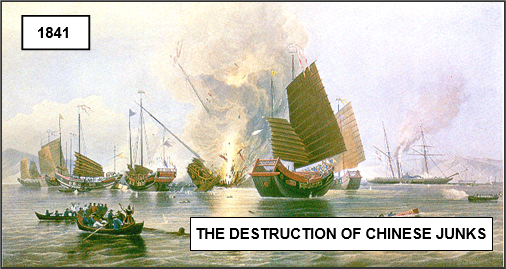 xxxxxThe first so-
xxxxxThe first so-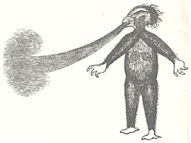 October to May. They were obliged to live and work in a riverbank area outside the city wall, were forbidden to travel inland, and were subject to a host of petty restrictions, and a Chinese law system which was often harsh and discriminatory. Furthermore the price of goods for export, particularly tea, was kept artificially high. The Chinese took the line that if the “Old Hairy Ones” wished to trade, then it had to be on Chinese terms.
October to May. They were obliged to live and work in a riverbank area outside the city wall, were forbidden to travel inland, and were subject to a host of petty restrictions, and a Chinese law system which was often harsh and discriminatory. Furthermore the price of goods for export, particularly tea, was kept artificially high. The Chinese took the line that if the “Old Hairy Ones” wished to trade, then it had to be on Chinese terms.
xxxxxAnd trade with China was made further precarious by the method of payment. The British East India Company, for example, which had secured the monopoly of trade in the area, paid for its imports from China -
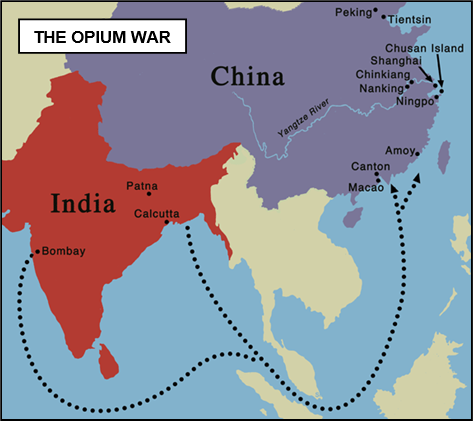 xxxxxIt was in that year that the emperor, Tao Kuang, decided it was time to act and sent an official to Canton in the March. He organised the burning of over 20,000 chests of the drug, and seized 16 merchants as hostages. The rest were kept in their quarters and made to sign statements that they would take no further part in the illegal trade. The British foreign secretary, Lord Palmerston, known for his gun-
xxxxxIt was in that year that the emperor, Tao Kuang, decided it was time to act and sent an official to Canton in the March. He organised the burning of over 20,000 chests of the drug, and seized 16 merchants as hostages. The rest were kept in their quarters and made to sign statements that they would take no further part in the illegal trade. The British foreign secretary, Lord Palmerston, known for his gun-
xxxxxThe British expeditionary force, made up of 16 warships, was under the command of Rear Admiral George Elliot. It reached Hong Kong in June 1840, and then sailed northward to the mouth of the River Canton to negotiate with the emperor. No agreement was reached, however, and in the following year the island of Hong Kong was occupied, and an attack was launched upon the walled city of Canton itself. In the meantime a British force arrived at Macau and advancing northward, captured key points along the coast, including Amoy, Tinghai, Chusan, Chinhai and Ningpo. In these campaigns the Chinese proved no match for the British. Their army was poorly equipped and led, and during the conflict their government was faced with civil unrest. The end of the war came in 1842. Shanghai was taken in the Spring and with the fall of Chinkiang and Nanking, and the likelihood of a march on Peking, the Chinese sued for peace.
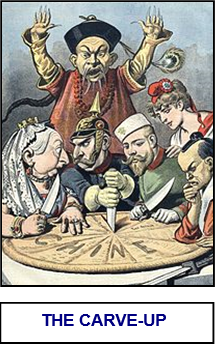 xxxxxThe Treaty of Nanking that followed, held in August 1842, was the first of what came to be known as the “unequal treaties”, a series of agreements over the next 16 years by which Western powers gained diplomatic rights and territorial concessions in China and, as we shall see, Japan. Byxthis treaty Britain acquired the island of Hong Kong as a secure trading base, and British merchants were allowed to reside and trade in five “treaty ports”, Shanghai, Ningpo, Foochow, Amoy, and Canton. And by a supplementary agreement, signed at the Treaty of the Bogue in October 1843, China was required to pay
xxxxxThe Treaty of Nanking that followed, held in August 1842, was the first of what came to be known as the “unequal treaties”, a series of agreements over the next 16 years by which Western powers gained diplomatic rights and territorial concessions in China and, as we shall see, Japan. Byxthis treaty Britain acquired the island of Hong Kong as a secure trading base, and British merchants were allowed to reside and trade in five “treaty ports”, Shanghai, Ningpo, Foochow, Amoy, and Canton. And by a supplementary agreement, signed at the Treaty of the Bogue in October 1843, China was required to pay 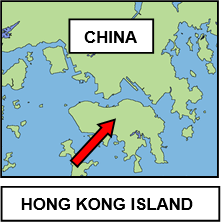 a huge indemnity -
a huge indemnity -
xxxxxThe cost of the war against the British, the large indemnity they demanded at its end, and the influx of barbarian merchants, left China seething with discontent. A crop failure of 1849, and the famine that followed, proved the last straw, and triggered off a peasant revolt known as the Taiping Rebellion in 1850. This swept across South China and brought with it renewed hostility towards foreigners in general and the opium trade in particular, a problem which, be it noted, the Treaty of Nanking had conveniently failed to address. As we shall see, attacks upon their nationals in 1856 brought both British and French forces to China in a combined attack upon the Chinese. It was the start of the Second Opium War.
xxxxxIncidentally, the opening up of the treaty ports by the Treaty of Nanking in 1842 brought about an influx of Western writings on a wide selection of subjects. These had to be translated into Chinese and two scholars stand out in this respect: Yen Fu translated a large number of Western philosophical works into classical Chinese, and Lin Shu translated more than 170 Western novels. ……
xxxxx…… As we shall see, British control over the Island of Hong Kong was extended at the end of the Second Opium War (1856-
Including:
The Treaty
of Nanking

Va-


